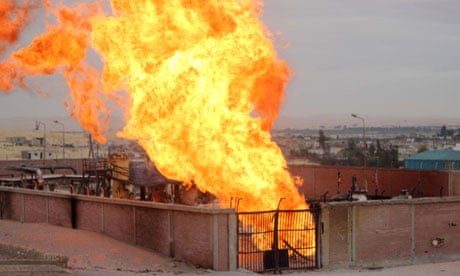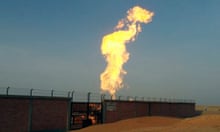An explosion went off at a gas terminal in Egypt's northern Sinai peninsula early this morning, setting off a fire that could be seen dozens of miles away, officials and witnesses said.
No injuries were reported and the blaze was quickly brought under control after the gas flow was shut off. The governor of the region, Abdel Wahab Mabrouk, said he suspected "sabotage", but provided no details.
The blast came as a popular uprising engulfs Egypt, where anti-government protesters have been demanding the ousting of longtime president Hosni Mubarak for the past two weeks.
The Sinai peninsula, home to Bedouin tribesmen, has been the scene of clashes between residents and security forces. It borders both Israel and the Gaza Strip, ruled by the Islamic militant Hamas.
The blast went off early this morning at a gas terminal in the northern Sinai town of el-Arish, several hundred metres away from the local airport.
Mabrouk told Egypt's Nile News TV that the fire was brought under control by mid-morning, after valves allowing the flow of gas from the terminal into pipelines were shut off. The pipelines transport gas from Egypt's Port Said on the Mediterranean sea to Israel, Syria and Jordan.
There were unconfirmed reports about the cause of the blast. Israel Radio quoted officials at the terminal as saying that a small explosive device had been detonated.
The blaze was visible from rooftops of homes next to the Gaza-Egypt border, about 44 miles away. A steady pillar of flames rose high into the air, but there was no smoke, and the fire died down by mid-morning, residents said.
The gas pipelines have come under attack in the past. Bedouin tribesmen attempted to blow up the pipeline last July as tensions intensified between them and the Egyptian government, which they accuse of discrimination.
Israel relies on the gas pipeline to meet its energy needs and spends billions to bring natural gas from Egypt. Israeli officials said it was not clear whether the explosion affected the pipeline leading to Israel.
"At this stage, the gas supply to Israel was stopped according to procedure in emergency scenarios," said Chen Ben Lulu, spokesman of Israel's infrastructure ministry. "We are not sure what caused the explosion."
Egypt has potential natural gas reserves of 62tn cubic feet (1.7tn cubic metres), the 18th largest in the world. It began providing Israel with natural gas in February 2008 under a deal by which it will sell Israel 60bn cubic feet a year for 15 years.
The deal raised controversy at home, with some in the Egyptian opposition saying the gas was being sold at below-market rates. Others resent Israel's treatment of Palestinians, and say Egypt shouldn't supply energy to Israel.
"The deal [to sell gas] was a blow to the pride of Egyptians and a betrayal," former diplomat Ibrahim Yousri told Associated Press today.
Yousri led a high court challenge to try to halt Egypt's sale of gas to Israel. Although the high court ruled in his favour in February 2010, the ruling was widely ignored by the government.


